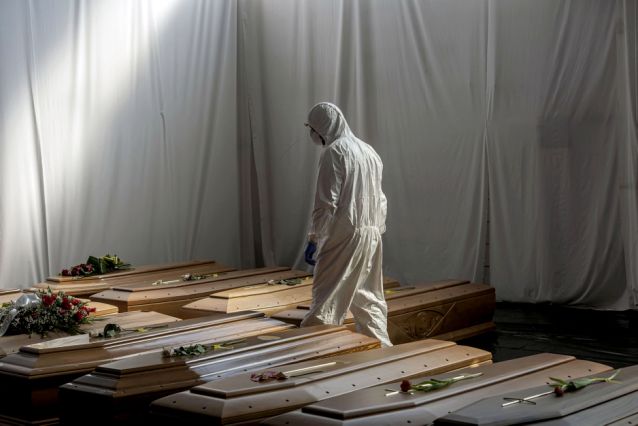Coronavirus
Europe Reaches Grim Milestone, Surpasses 100,000 Coronavirus Deaths

Europe reached a somber marker on Sunday, surpassing 100,000 coronavirus deaths across the continent, according to a Johns Hopkins University tally.
Italy continued to have the highest European death toll in the pandemic with more than 23,000 deaths as of Sunday, followed by Spain, France and the United Kingdom.
Despite those staggering numbers, Italy has nudged closer to easing some lockdown measures, but restrictions remain largely in place. The Italian government said it was evaluating procedures for how best to allow citizens out again.
“We are working on some proposals to soften the restrictive measures and let everyone live safely with the virus during the next months,” Prime Minister Giuseppe Conte told Italian newspaper “Il Giornale”, on Sunday morning.
The government is under pressure from its industrial northern region to reopen as soon as possible, but lockdown measures will remain in place until at least May 3, officials said.
Meanwhile in Spain, Prime Minister Pedro Sanchez said his government would begin easing measures and allowing children under 12 to play outdoors for short periods of time. The country’s lockdown will remain in place until at least May 9, he said during a televised national address on Saturday. Warning “the goals we’ve achieved so far are fragile.”
Britain is fast becoming the European epicenter of the contagion, as deaths passed 16,000 people on Sunday. Healthcare workers criticized the government over the weekend for shortages of personal protective equipment (PPE), such as gowns and face shields.
“Too many healthcare workers have already died. More doctors and their colleagues cannot be expected to put their own lives on the line in a bid to save others,” said Rob Harwood of the British Medical Association, a professional body which represents medical staff.
A spokesperson for Britain’s Ministry of Health told NBC News on Saturday there was a 24-hour helpline in place for health workers to call and report shortages in supplies.
“We are working round the clock, given the global shortage of gowns and other PPE, to secure the NHS and the social care sector the equipment they need,” the spokesperson said by email.
Prime Minister Boris Johnson continues to recuperate from COVID-19, the disease associated with coronavirus, after he left the hospital a week ago. Foreign Secretary Dominic Raab has been filling in for Johnson during his absence.
Last week in France, President Emmanuel Macron admitting failings during a televised national address. He acknowledged that his office had been insufficiently prepared and caught off guard with the coronavirus outbreak, in particular by the lack of medical equipment.
“Were we ready for this crisis? Clearly not ready enough, but we have faced up to it,” he said. “Let’s be honest: Events revealed weaknesses, deficiencies.”
Although the number of patients in France’s intensive care units was falling, he said, the epidemic was still not under control, as he extended lockdown measures until May 11.
Some European countries, however, such as Austria and the Czech Republic, have begun easing lockdown restrictions, attempting the slow return to normal life. While many continue to eye Germany as a European model, which has maintained a relatively long-term plateau of cases and rolled out extensive testing.
Kenya Insights allows guest blogging, if you want to be published on Kenya’s most authoritative and accurate blog, have an expose, news TIPS, story angles, human interest stories, drop us an email on [email protected] or via Telegram
-

 Grapevine5 days ago
Grapevine5 days agoAlleged Male Lover Claims His Life Is in Danger, Leaks Screenshots and Private Videos Linking SportPesa CEO Ronald Karauri
-

 Lifestyle1 week ago
Lifestyle1 week agoThe General’s Fall: From Barracks To Bankruptcy As Illness Ravages Karangi’s Memory And Empire
-

 Americas2 weeks ago
Americas2 weeks agoEpstein Files: Bill Clinton and George Bush Accused Of Raping A Boy In A Yacht Of ‘Ritualistic Sacrifice’
-

 Investigations1 week ago
Investigations1 week agoEpstein Files: Sultan bin Sulayem Bragged on His Closeness to President Uhuru Then His Firm DP World Controversially Won Port Construction in Kenya, Tanzania
-

 Business2 weeks ago
Business2 weeks agoABSA BANK IN CRISIS: How Internal Rot and Client Betrayals Have Exposed Kenya’s Banking Giant
-

 News2 weeks ago
News2 weeks agoAUDIT EXPOSES INEQUALITY IN STAREHE SCHOOLS: PARENTS BLED DRY AS FEES HIT Sh300,000 AGAINST Sh67,244 CAP
-

 Business2 weeks ago
Business2 weeks agoKRA Can Now Tax Unexplained Bank Deposits
-

 News1 week ago
News1 week agoState Agency Exposes Five Top Names Linked To Poor Building Approvals In Nairobi, Recommends Dismissal After City Hall Probe














